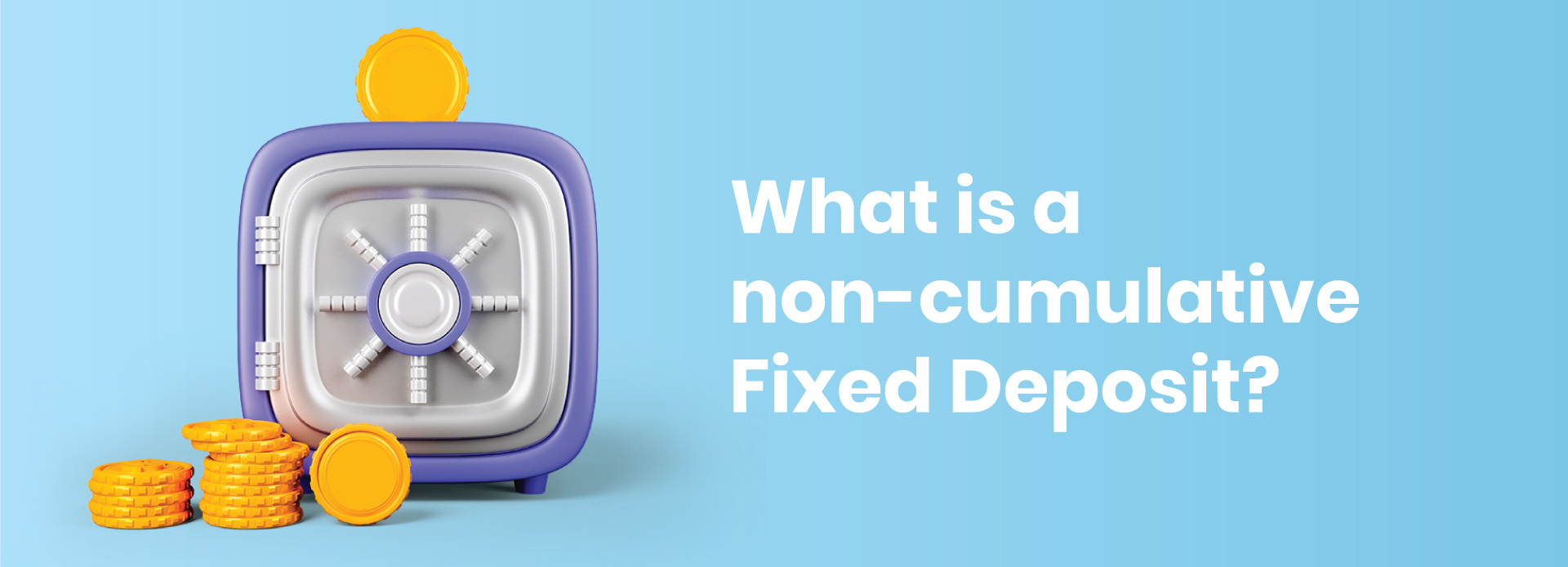
What is Non-Cumulative Fixed Deposit (FD)
29 June 2024 | By INDIE
Fixed Deposits are term-based deposits which are safe and reliable. Broadly there are two types of FDs – Cumulative and Non-Cumulative. The major difference between these two is the interest payout. In cumulative FD, the compounded interest is paid together with the principal amount once it matures. In Non-Cumulative FD, the interest is paid periodically as decided by the depositor. This serves as a regular source of income.
What is a non-cumulative Fixed Deposit?
Non-cumulative Fixed Deposits are deposits where the interest is paid monthly, quarterly, half-yearly or annually, depending on the frequency chosen by the depositor. These FDs are a good option for those who do not want to take risks and are also looking for a regular source of income. The interest is credited to the depositor’s bank account, helping them meet their financial needs or achieve specific goals.
As the interest amount is not reinvested by adding to the principal amount, the maturity amount in on non-cumulative FDs is less.
Features of Non-Cumulative Fixed Deposit
● Frequency of Interest payout: The interest on non-cumulative deposits is given out as instructed by the depositor.
● Source of Regular Income: The recurring interest payouts at regular intervals provide a source of regular income. This helps you with your financial requirements.
● Direct access to earned Interest: The interest is directly credited to the depositor's bank account, thus providing instant access to funds when needed.
● Low-interest rate: As the power of compounding is not utilized, the interest rate is generally low.
Eligibility for Non-Cumulative Fixed Deposit
The eligibility criteria for opening a non-cumulative fixed deposit are the same as those for opening regular FD. However, it is better to check with the concerned bank as specific requirements may vary.
Opening a non-cumulative FD is the same as opening a regular FD. However, in this case along with the tenure of the Fixed Deposit, you will also have to select the frequency in which you wish to receive the interest. You also need to provide the details of the bank account in which the interest would be credited. The bank will then calculate the interest amount based on the principal amount and tenure and inform you.
While investing in non-cumulative FD, you should keep in mind your financial and liquidity needs.
Documents required for Non-Cumulative Fixed Deposits
The list of documentation for Non-cumulative fixed deposits generally includes:
● Proof of Identity: Aadhar Card, Driving License, PAN Card
● Proof of Address: Aadhar Card, Bank statements, utility bills
● Photograph: Passport-sized photo of the depositor
● PAN Card: PAN (Permanent Account Number) of the depositor for tax purposes
Is a non-cumulative fixed deposit the right choice for you?
If you are looking for a regular source of income on a monthly or quarterly basis, then you can opt for a non-cumulative fixed deposit. Depending upon the fund availability and use of the same in the future, you can select the frequency of interest payment. It is a safe and reliable investment with minimal risk, suitable mostly for pensioners and the like. In the case of cumulative FDs, the principal amount and interest are accessible after the completion of fixed tenure. Contrary to this, in the case of non-cumulative FDs, the interest amount is accessible immediately on credit which can help you with short-term needs.
Things to remember before investing in Non-Cumulative Fixed Deposit
You should definitely check the following points before investing in non-cumulative Fixed Deposit:
● Tax implications: The interest earned on these deposits might be taxable depending on your income.
● Tenure: Check and understand the tenure of your deposit so as to avoid premature withdrawals in future.
● Payout frequency: Choose the frequency that will help you achieve your financial goals.
You should definitely go for non-cumulative FDs if you want stable and consistent returns.
Also Read: 5 Reasons To Invest In Fixed Deposits
Disclaimer: The information provided in this article is generic and for informational purposes only. It is not a substitute for specific advice in your circumstances. Hence, you are advised to consult your financial advisor before making any financial decision. IndusInd Bank Limited (IBL) does not influence the views of the author in any way. IBL and the author shall not be responsible for any direct/indirect loss or liability incurred by the reader for making any financial decisions based on the contents and information.




